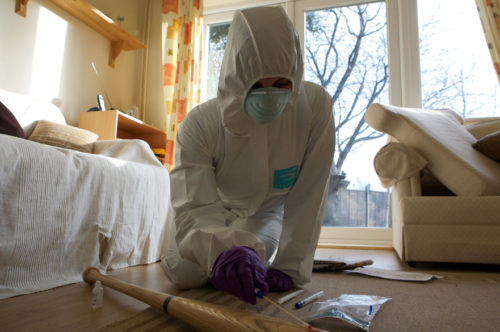COURSE OVERVIEW
Technological advances have made the role of the forensic scientist – the expert who collects, preserves and analyses evidence – increasingly important in crime investigation, and also in other fields such as archaeology.
The course starts with an introduction to psychology and the sciences relevant to forensics, followed by more detailed applied forensics including the preparation of evidence for court, pathology, medical physiology and haematology. You’ll also study the most recent advances in DNA analysis, toxicology, criminal psychology, and fire and explosive analysis.
WHY CHOOSE THIS COURSE?
- The Forensic Science team includes international experts in the psychology of criminal behaviour and forensics experts from a variety of operational backgrounds
- Our teaching is rated as ‘Excellent’ by the QAA and the team is part of a highly experienced department that has run biological science courses for over 30 years
- You’ll study in a specialist forensic laboratory, with key laboratory skills incorporated into most of the taught units, especially your final-year research project
- You’ll learn the skills and techniques needed to evaluate a real-life crime scene in our scene-of-crime lab, designed to resemble an ‚normal’ flat
- There’s the option to take the course over four years and include a year’s work placement (see below) to gain experience and industry contacts
- If you’d like to step-up into higher education, you can take an introductory Foundation Year (see below), which guarantees entry to the Undergraduate course
CAREER PROSPECTS
Lecturing staff are actively engaged in scientific research, and have previous experience in academic, government, charity or industry research laboratories. Our teaching and the course are directly informed by our research knowledge and activities.
Key aspects of the course that emphasise employability include:
- Training in key laboratory techniques relevant to employment within Forensic Science, including awareness of relevant health, safety, legal and ethical considerations.
- Training and practice in the scientific method that underpins all scientific research (developing novel hypotheses, testing these by experiment, accurately interpreting data, understanding error, and drawing valid conclusions).
- Practice in forensic professional standards of reporting including witness statements, crime scene logs, examination forms and case reports.
- Practice in academic professional standards of reporting including laboratory reports, conference posters, written and oral presentations.
- Maintenance of laboratory diaries and research diaries following standard practice within the field.
- Guest lectures from employers and from the University’s careers service.
Zobacz więcej na stronie uniwersytetu >>
Wiza studencka do Wielkiej Brytanii
Aby studiować w Wielkiej Brytanii potrzebujesz wizy studenckiej. Aby złożyć wniosek o taką wizę studencką musisz zdjać certyfikat językowy na poziomie B2.
Uważaj! Do celów wizowych musisz wybrać wyłącznie egzamin w wesji Secure English Language Test (SELT) UKVI .
Co to jest test SELT UK VI registration? Przeczytaj więcej o testach SELT UKVI >>




















